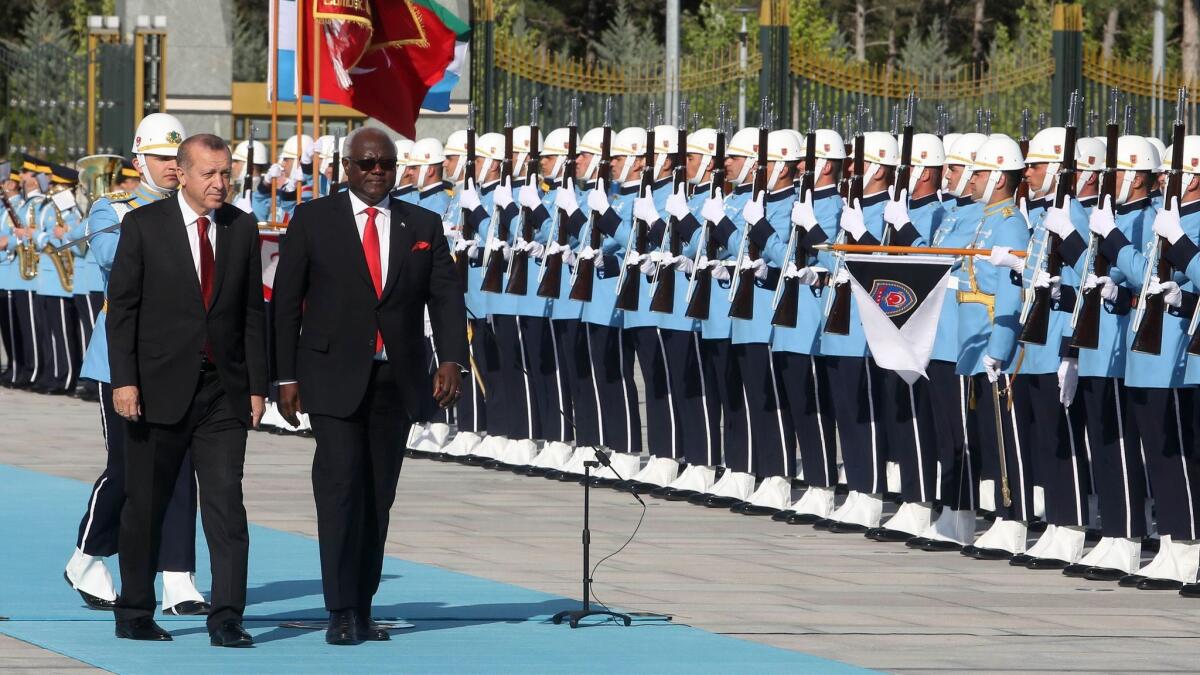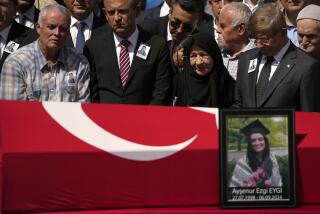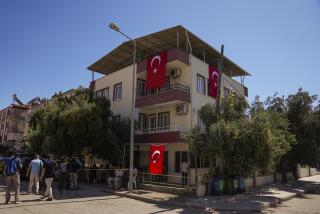Erdogan’s authoritarian style and pragmatic foreign policy turn some Turkish Islamists against him
- Share via
Reporting from Istanbul, Turkey — Last month’s constitutional referendum may have yielded a victory for President Recep Tayyip Erdogan, enshrining vast powers for him and his Justice and Development Party, or AKP, but the results were far closer than his supporters were expecting, largely because of growing discontent within Turkey’s conservatives.
Erdogan has counted on conservatives’ support for more than 14 years, but his authoritarian style of governance and his pragmatic foreign policy are pushing a segment of Turkey’s Islamists to turn against him.
For the record:
11:32 a.m. June 21, 2019An earlier version of this article incorrectly stated that the Mavi Marmara incident occurred in 2009. It took place in 2010. It also incorrectly quoted Unsal as referring to a group of 150 party members; not all of them were party members. It also incorrectly stated that the head of Mazmunder left parliament in 2013; he left parliament in 2007 and the party in 2009.
“The AKP is no longer a humble party. It cannot hear any criticism, whether from its own members or from others,” said Abdullatif Sener, one of 74 people who founded the party in 2001 and who served as deputy prime minister under Erdogan until he quit in 2007. “Those critics still in the party have no power to direct it. Many are keeping quiet themselves, because they know if they criticize Erdogan, the next day they will be targeted.”
As dissenters like Sener have left the AKP’s ranks, those who have remained have taken a back seat to Erdogan. Former President Abdullah Gul and former Prime Minister Ahmet Davutoglu — reportedly forced by Erdogan to resign last year — have not quit the party altogether, but their reservations with Erdogan’s policies have left them largely sidelined.
“The AKP is a broad umbrella party that has amassed Islamists, less politicized religious conservatives and even traditional center-right voters who care about economic benefits,” said Mustafa Akyol, an expert on Turkey’s Islamist movements. “In the past four or five years, however, the party has been taken over by a cult of personality built around Erdogan.”
Erdogan’s Machiavellian ways, Akyol says, have put him at odds with Islamists on a range of foreign and domestic issues, and although the dissenting conservatives probably represent less than 4% of the electorate, the close margin of victory for Erdogan in April’s referendum indicates it could become an important demographic in Turkey.
Among the dissenting Islamist movements is the Saadet Party, a movement made up of ultraconservatives that in some ways is the intellectual predecessor to the AKP, but whose leadership actively campaigned against the April constitutional changes. Saadet’s small but influential constituency of traditional Islamists, says Akyol, helped the “no” vote win in unexpected places, including Istanbul’s Uskudar district, where Erdogan lives and 53.3% of voters rejected the amendments.
Many are keeping quiet themselves, because they know if they criticize Erdogan, the next day they will be targeted.
— Abdullatif Sener, a founder of the Justice and Development Party in 2001
But the Saadet Party represents just one facet of a growing faction of anti-Erdogan conservatives.
Fatma Bostan Unsal, another core AKP founder, was purged from the party last year over her views on how to deal with the country’s Kurdish insurgency.
“It should be normal for religious people to be critical of government policy,” Unsal said. “But now, if you are critical of the government, it turns into something ridiculous; it turns into a controversy.”
In the party’s early days, Unsal said, the priority for her and other Islamists was lifting restrictions on the head scarf, which kept her and millions of other women out of the public sphere. But over the next decade, Unsal realized Erdogan and the AKP were more interested in consolidating power than dealing with issues like the head scarf ban.
“I raised the issue at many closed meetings, I said we need to run candidates wearing the head scarf, and I and a group of maybe 150 women in the party threatened to start a public movement if this was not done.”
In response, Erdogan accused the dissenters of trying to abuse the head scarf issue. “After that, I kept attending party meetings, but I did not raise my voice,” Unsal said. It wasn’t until 2013 that the AKP allowed a head scarf candidate to run on a party ticket. In 2014, an AKP lawmaker became the first woman in Turkey to give a speech in parliament wearing a head scarf.
Last January, Unsal and more than a thousand other academics were labeled “traitors” by Erdogan for signing a petition calling for a cease-fire in the Kurdish conflict. Unsal, a career academic, is now one of 145,000 public workers who have lost their jobs. Her passport has been revoked, and her signature on the peace petition could draw terrorism charges for allegedly supporting the outlawed Kurdistan Workers Party. Because she had a credit card with a bank linked to Fethullah Gulen, the cleric Ankara blames for last year’s coup attempt, Unsal could face detention for alleged affiliations with that movement as well.
Erdogan’s foreign policy did not fit with what Unsal and the other dissenters expected, either. Whether it was the decision to support the U.S.-led invasion of Iraq in 2003 or restore ties with Israel after the Mavi Marmara incident in 2010 — in which Israeli commandos stormed a Turkish ship off the Gaza Strip coast, leaving nine people dead on deck and one fatally injured — Erdogan seemed to stray from core Islamist views and strike a politically expedient path instead.

Turkey’s largest humanitarian organization, the Human Rights Foundation, or IHH, which organized the Mavi Marama attempt to enter Gaza, occasionally calls for protests to mark the deadly raid, but its attempts to pursue criminal cases against Israel in Turkish and international courts have been stifled by the AKP. Last month, one of Erdogan’s best-known supporters, columnist Cem Kucuk, called for the expulsion of “maniac” Islamists supporting the foundation from the AKP’s ranks. Outrage among Islamists over those remarks prompted Erdogan to weigh in himself, saying no one but him and his staff spoke for his office.
While the foundation has weathered the storm so far, other Islamist civil society groups have not.
Mazlumder, one of Turkey’s best-known human rights monitoring groups, was founded by a group of Islamists in 1991, and for more than a decade many of its efforts were focused on documenting the effects of state discrimination against conservatives. At one point, its leaders were imprisoned and its offices shuttered over allegations that it was seeking to upend Turkey’s secular foundation, similar to the charges that sent Erdogan to prison in 1999. More than 50 former Mazlumder members have gone on to serve as leaders in the AKP.
Back then, says Reha Ruhavioglu, the organization’s head in the southeastern city of Diyarbakir, the focus for conservative human rights activists was a state bureaucracy dominated by a secular military. Today it is fellow conservatives in the AKP that are targeting Mazlumder.
Mazlumder, like Saadet, opposes arming the Syrian rebels. In 2013, it published reports documenting what it said was excessive use of force by police dispersing protesters in Gezi Park.
It should be normal for religious people to be critical of government policy.
— Fatma Bostan Unsal, AKP co-founder who was purged from the party last year
“We had problems with some of our [pro-AKP] colleagues over the Syrian war, and over Gezi, but those divisions really widened with our reports on the Kurdish conflict,” said Ruhavioğlu.
In 2016, Ruhavioglu was part of a delegation of human rights monitors to the southeastern district of Cizre, where government forces had just lifted a 78-day curfew. They met with AKP officials and opposition parties and spent days interviewing locals, eventually concluding that up to 290 people were killed in the district, many of them civilians. After weeks of heated arguments with pro-AKP Mazlumder colleges in Istanbul, Ruhavioglu finally got a draft approved for publication that he believed was balanced in criticism of the government and the Kurdish insurgents.
Then one day, Ruhavioglu watched on national television as Erdogan lambasted his work, throwing Mazlumder into the same category with secular groups that were working against the AKP. “Who are you to publish this report?” a fiery Erdogan told a gathering of police officers. “There is a limit to our mercy…. Either bow your heads or lose your heads.”
When a national television channel called to interview him, Ruhavioglu decided to speak out. “I don’t generally talk to media,” Ruhavioglu said, “but I went on the air because of what the president said. I told them he can cut off our heads, but he can’t make us obey.”
“The content of the report was left behind, and the main topic became whose name was on the report,” Ruhavioglu said. “The thing was quickly getting out of hand. There was a harsh political climate, coming from the top, and suddenly, the principles we had been using for 26 years, emphasizing the responsibility of both sides in conflict, were forgotten.”
In March, Mazlumder experienced a coup of its own: A court-appointed government trustee forced out the organization’s leadership, including its head, who left a seat as an AKP parliament member in 2013 to head the human rights group. All 16 of the organization’s offices in the Kurdish southeast were closed, and thousands of members deemed too critical of Erdogan were purged.
Farooq is a special correspondent.
UPDATES:
6 p.m.: This article has been updated to reflect the fatal injury of a 10th victim in the Mavi Marmara incident.
It was first published at 11:20 a.m.
More to Read
Sign up for Essential California
The most important California stories and recommendations in your inbox every morning.
You may occasionally receive promotional content from the Los Angeles Times.










